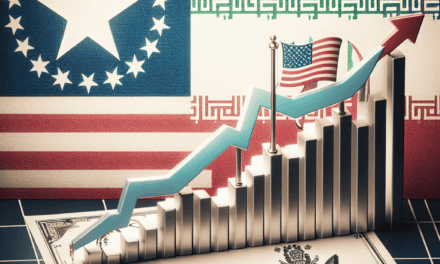“Activist Winds May Shift, But Pfizer’s Strength Endures.”
Introduction
Pfizer Inc., a global pharmaceutical giant, has recently faced an activist challenge that has captured the attention of investors and market analysts alike. While such challenges can often lead to significant shifts in corporate strategy or governance, the impact on Pfizer may be more transient than transformative. Despite the potential for activist influence to wane, Pfizer’s stock is poised to maintain its strength, buoyed by its robust pipeline, strategic acquisitions, and a strong track record of innovation and financial performance. The company’s ability to navigate complex market dynamics and its commitment to delivering shareholder value suggest that its stock will remain resilient, even as the immediate pressures of activist involvement subside.
Pfizer’s Resilience Amid Activist Challenges
Pfizer Inc., a global pharmaceutical giant, has recently found itself in the crosshairs of activist investors, a scenario not uncommon in the corporate world. These investors often seek to influence a company’s operations, governance, or financial strategies to unlock shareholder value. While such challenges can be disruptive, Pfizer’s robust market position and strategic initiatives suggest that its stock is likely to remain resilient, even if the activist challenge fades over time.
Activist investors typically target companies they perceive as undervalued or mismanaged, aiming to implement changes that could enhance shareholder returns. In Pfizer’s case, the company’s vast portfolio of products, including its groundbreaking COVID-19 vaccine, has positioned it as a leader in the pharmaceutical industry. This strong market presence provides a solid foundation that can withstand external pressures. Moreover, Pfizer’s commitment to innovation and research and development (R&D) continues to drive its growth prospects, making it an attractive investment despite the activist noise.
Transitioning to the financial aspect, Pfizer’s consistent revenue streams and strategic acquisitions have bolstered its financial health. The company’s ability to generate substantial cash flow allows it to invest in new drug development and expand its pipeline, ensuring long-term sustainability. Furthermore, Pfizer’s strategic focus on high-growth areas, such as oncology and rare diseases, aligns with global healthcare trends, providing additional growth opportunities. This strategic alignment not only enhances Pfizer’s competitive edge but also reassures investors of its potential for sustained profitability.
In addition to its strategic initiatives, Pfizer’s strong balance sheet and prudent financial management have enabled it to weather economic uncertainties. The company’s disciplined approach to cost management and operational efficiency has resulted in improved margins, further strengthening its financial position. This resilience is particularly crucial in the face of activist challenges, as it underscores Pfizer’s ability to navigate complex market dynamics while maintaining shareholder value.
Moreover, Pfizer’s commitment to shareholder returns through dividends and share buybacks has been a key factor in maintaining investor confidence. The company’s consistent dividend payments reflect its financial stability and dedication to returning value to shareholders. This approach not only mitigates the impact of activist pressures but also reinforces Pfizer’s reputation as a reliable investment choice.
While activist investors may push for changes in Pfizer’s strategic direction or governance, the company’s strong fundamentals and strategic vision suggest that any such challenges are likely to be temporary. Pfizer’s leadership team, with its deep industry expertise and focus on long-term value creation, is well-equipped to address shareholder concerns while staying true to its strategic objectives. This balance between addressing immediate challenges and pursuing long-term growth is crucial in maintaining investor trust and ensuring the company’s continued success.
In conclusion, while Pfizer’s encounter with activist investors may create short-term volatility, its strong market position, strategic initiatives, and financial resilience are likely to keep its stock robust. The company’s focus on innovation, strategic growth areas, and shareholder returns positions it well for future success, even as the activist challenge may eventually fade. As such, Pfizer remains a formidable player in the pharmaceutical industry, with a promising outlook that is likely to sustain investor confidence in the long run.
Long-term Growth Prospects for Pfizer
Pfizer Inc., a global pharmaceutical giant, has long been a stalwart in the healthcare industry, renowned for its innovative drug development and robust pipeline. Recently, the company faced an activist challenge that garnered significant attention from investors and analysts alike. While such challenges can often lead to substantial shifts in corporate strategy, it appears that Pfizer’s activist challenge may fade over time. However, this does not necessarily imply a negative outlook for the company’s stock. On the contrary, Pfizer’s long-term growth prospects remain promising, suggesting that its stock is likely to stay strong.
To understand why Pfizer’s stock is poised for continued strength, it is essential to consider the company’s strategic initiatives and market positioning. Pfizer has consistently demonstrated its ability to adapt to changing market dynamics and regulatory environments. The company’s focus on research and development has resulted in a robust pipeline of new drugs, which is crucial for sustaining long-term growth. Moreover, Pfizer’s strategic acquisitions and partnerships have further bolstered its portfolio, enabling it to maintain a competitive edge in the pharmaceutical industry.
In addition to its strong pipeline, Pfizer’s financial health is another factor contributing to its positive long-term outlook. The company has maintained a solid balance sheet, with healthy cash flows and manageable debt levels. This financial stability provides Pfizer with the flexibility to invest in new growth opportunities, whether through internal development or strategic acquisitions. Furthermore, Pfizer’s commitment to returning value to shareholders through dividends and share buybacks underscores its confidence in its future prospects.
Another critical aspect of Pfizer’s long-term growth potential is its ability to capitalize on emerging trends in the healthcare sector. The company has been at the forefront of developing innovative therapies, particularly in areas such as oncology, immunology, and vaccines. The success of its COVID-19 vaccine, developed in partnership with BioNTech, is a testament to Pfizer’s capabilities in rapidly bringing new products to market. As the global demand for advanced healthcare solutions continues to rise, Pfizer is well-positioned to benefit from these trends.
Moreover, Pfizer’s global reach and established presence in key markets provide it with a significant advantage. The company’s extensive distribution network and strong relationships with healthcare providers enable it to effectively market and distribute its products worldwide. This global footprint not only enhances Pfizer’s revenue potential but also mitigates risks associated with regional market fluctuations.
While the activist challenge may have introduced some uncertainty in the short term, it is unlikely to have a lasting impact on Pfizer’s long-term growth trajectory. The company’s strong fundamentals, strategic initiatives, and ability to adapt to industry trends position it well for sustained success. Investors can take confidence in Pfizer’s track record of delivering shareholder value and its commitment to innovation.
In conclusion, while Pfizer’s activist challenge may eventually fade, the company’s stock is likely to remain strong due to its solid financial position, robust pipeline, and strategic focus on growth areas within the healthcare sector. As the demand for innovative therapies and vaccines continues to grow, Pfizer is well-equipped to capitalize on these opportunities, ensuring its long-term success and continued strength in the stock market.
Analyzing Pfizer’s Market Position
Pfizer Inc., a global pharmaceutical giant, has recently found itself in the crosshairs of activist investors, a scenario that has become increasingly common in the corporate world. These investors often seek to influence a company’s strategy to unlock shareholder value, and in Pfizer’s case, the focus has been on its strategic direction and capital allocation. However, while the activist challenge may eventually fade, Pfizer’s robust market position suggests that its stock is likely to remain strong.
To understand why Pfizer’s stock is poised for resilience, it is essential to consider the company’s solid foundation in the pharmaceutical industry. Pfizer has a well-established portfolio of products, including vaccines, oncology treatments, and rare disease therapies, which continue to generate substantial revenue. The company’s COVID-19 vaccine, developed in partnership with BioNTech, has been a significant revenue driver, contributing to Pfizer’s financial strength. Moreover, Pfizer’s commitment to research and development ensures a steady pipeline of new products, which is crucial for long-term growth in the highly competitive pharmaceutical sector.
In addition to its product portfolio, Pfizer’s strategic initiatives have positioned it well for future success. The company has been actively pursuing acquisitions and partnerships to bolster its capabilities and expand its reach. For instance, Pfizer’s acquisition of Array BioPharma in 2019 enhanced its oncology pipeline, while its collaboration with BioNTech has not only been pivotal in the fight against COVID-19 but also opened doors for future mRNA-based therapies. These strategic moves demonstrate Pfizer’s proactive approach to staying at the forefront of medical innovation.
Furthermore, Pfizer’s financial health is another factor contributing to its strong market position. The company has consistently delivered solid financial results, with robust revenue growth and healthy profit margins. Its strong balance sheet provides the flexibility to invest in research and development, pursue strategic acquisitions, and return value to shareholders through dividends and share buybacks. This financial stability is a key reason why Pfizer’s stock is likely to remain attractive to investors, even in the face of activist challenges.
While activist investors may push for changes in Pfizer’s strategy, the company’s management has shown a willingness to adapt and evolve. Pfizer has been responsive to shareholder concerns, as evidenced by its efforts to streamline operations and focus on core areas of growth. This adaptability is crucial in maintaining investor confidence and ensuring that the company remains competitive in a rapidly changing industry.
Moreover, the broader pharmaceutical market dynamics also play a role in Pfizer’s favorable outlook. The global demand for innovative therapies and vaccines continues to rise, driven by an aging population and the increasing prevalence of chronic diseases. Pfizer’s strong market position and extensive research capabilities make it well-equipped to capitalize on these trends, further supporting the resilience of its stock.
In conclusion, while the activist challenge facing Pfizer may eventually dissipate, the company’s strong market position, strategic initiatives, and financial health suggest that its stock is likely to remain robust. Pfizer’s ability to adapt to changing market conditions and its commitment to innovation position it well for sustained success in the pharmaceutical industry. As a result, investors can remain confident in Pfizer’s potential for long-term growth and value creation.
Pfizer’s Strategic Initiatives for Stability

Pfizer Inc., a global leader in the pharmaceutical industry, has recently faced an activist challenge that, while significant, may not have a lasting impact on its stock performance. The company’s strategic initiatives, designed to ensure stability and growth, are likely to maintain investor confidence and support its stock’s resilience. As the pharmaceutical giant navigates these challenges, it is essential to examine the factors contributing to its enduring strength in the market.
To begin with, Pfizer’s robust pipeline of innovative drugs and vaccines remains a cornerstone of its strategic initiatives. The company has consistently invested in research and development, ensuring a steady flow of new products that address unmet medical needs. This commitment to innovation not only enhances its competitive edge but also positions Pfizer to capitalize on emerging healthcare trends. For instance, the company’s advancements in mRNA technology, which played a pivotal role in the development of its COVID-19 vaccine, have opened new avenues for future therapeutic applications. Consequently, these innovations are expected to drive revenue growth and sustain investor interest.
Moreover, Pfizer’s strategic acquisitions and partnerships have been instrumental in bolstering its market position. By acquiring companies with complementary capabilities and entering into strategic alliances, Pfizer has expanded its product portfolio and enhanced its global reach. These initiatives have allowed the company to diversify its revenue streams and mitigate risks associated with market fluctuations. For example, the acquisition of Array BioPharma has strengthened Pfizer’s oncology pipeline, providing a solid foundation for future growth in this high-demand therapeutic area. Such strategic moves underscore Pfizer’s proactive approach to maintaining stability and ensuring long-term success.
In addition to its focus on innovation and strategic partnerships, Pfizer has demonstrated a strong commitment to operational efficiency. The company has implemented cost-saving measures and streamlined its operations to enhance profitability. By optimizing its supply chain and leveraging digital technologies, Pfizer has improved its operational agility, enabling it to respond swiftly to market changes. This focus on efficiency not only supports the company’s financial performance but also reinforces its ability to deliver value to shareholders.
Furthermore, Pfizer’s global presence and established brand reputation contribute significantly to its stability. With a vast network of manufacturing facilities and a strong distribution infrastructure, the company is well-positioned to meet the demands of diverse markets worldwide. Its reputation for quality and reliability has earned the trust of healthcare providers and patients alike, ensuring a steady demand for its products. This global footprint not only provides a buffer against regional economic uncertainties but also offers opportunities for growth in emerging markets.
While the activist challenge may have introduced some uncertainty, Pfizer’s strategic initiatives provide a solid foundation for continued stability. The company’s focus on innovation, strategic acquisitions, operational efficiency, and global reach are key factors that underpin its resilience in the face of external pressures. As a result, Pfizer’s stock is likely to remain strong, supported by its ability to adapt to changing market dynamics and deliver sustainable growth.
In conclusion, Pfizer’s strategic initiatives are well-aligned with its goal of maintaining stability and driving long-term success. By prioritizing innovation, strategic partnerships, operational efficiency, and global expansion, the company is well-equipped to navigate challenges and capitalize on opportunities. As such, while the activist challenge may fade, Pfizer’s stock is expected to continue its strong performance, reflecting the company’s enduring strength and commitment to delivering value to its stakeholders.
Investor Confidence in Pfizer’s Stock
Pfizer Inc., a global pharmaceutical giant, has recently faced an activist challenge that has captured the attention of investors and analysts alike. While such challenges can often lead to significant shifts in a company’s strategic direction, the impact on Pfizer’s stock is expected to be minimal in the long term. This is largely due to the company’s robust fundamentals and its strong position in the pharmaceutical industry. As the activist challenge begins to fade, investor confidence in Pfizer’s stock remains steadfast, bolstered by several key factors that continue to drive its performance.
To begin with, Pfizer’s extensive portfolio of products and its pipeline of innovative drugs provide a solid foundation for sustained growth. The company has consistently demonstrated its ability to develop and commercialize new therapies, which not only address unmet medical needs but also generate substantial revenue. This capability is further enhanced by Pfizer’s strategic investments in research and development, which ensure a steady flow of new products to market. Consequently, investors can take comfort in the knowledge that Pfizer is well-positioned to maintain its competitive edge in the pharmaceutical sector.
Moreover, Pfizer’s financial health is another critical factor that underpins investor confidence. The company boasts a strong balance sheet, characterized by healthy cash flows and manageable levels of debt. This financial stability enables Pfizer to pursue strategic acquisitions and partnerships, which can further enhance its growth prospects. Additionally, the company’s commitment to returning value to shareholders through dividends and share buybacks serves as a testament to its financial strength and its focus on shareholder returns. These factors collectively contribute to a positive outlook for Pfizer’s stock, even in the face of temporary challenges.
Furthermore, the global demand for healthcare solutions continues to rise, driven by an aging population and the increasing prevalence of chronic diseases. Pfizer is well-positioned to capitalize on these trends, given its diverse product offerings and its focus on therapeutic areas with significant growth potential. The company’s ability to adapt to changing market dynamics and to address emerging healthcare needs ensures that it remains a key player in the industry. This adaptability, coupled with its strong market presence, reinforces investor confidence in Pfizer’s long-term prospects.
In addition to these factors, Pfizer’s proactive approach to addressing the activist challenge has also played a role in maintaining investor confidence. By engaging constructively with the activist investor and taking steps to address their concerns, Pfizer has demonstrated its commitment to enhancing shareholder value. This approach not only mitigates the potential impact of the activist challenge but also reinforces the company’s reputation as a responsive and responsible corporate entity.
In conclusion, while Pfizer’s activist challenge may have initially raised concerns among investors, the company’s strong fundamentals and strategic initiatives have helped to alleviate these worries. As the challenge begins to fade, investor confidence in Pfizer’s stock is likely to remain strong, supported by the company’s robust product portfolio, financial health, and ability to adapt to evolving market conditions. Consequently, Pfizer’s stock is expected to continue performing well, providing investors with a reliable and attractive investment opportunity in the pharmaceutical sector.
The Impact of Activist Challenges on Pfizer
Pfizer, a global pharmaceutical giant, has recently found itself in the crosshairs of activist investors, a scenario not uncommon in the corporate world. Activist investors typically seek to influence a company’s management and operations to unlock shareholder value, often through strategic changes or restructuring. While such challenges can initially create waves of uncertainty, Pfizer’s robust market position and strategic initiatives suggest that any activist challenge may eventually fade, leaving its stock performance resilient.
Activist investors often target companies they perceive as undervalued or mismanaged, aiming to implement changes that could enhance shareholder returns. In Pfizer’s case, the company’s vast portfolio of products and its strong pipeline of new drugs make it an attractive target. However, Pfizer’s management has consistently demonstrated a commitment to innovation and strategic growth, which may mitigate the impact of activist pressures. For instance, the company’s focus on research and development, particularly in areas such as oncology and vaccines, underscores its long-term growth potential. This commitment to innovation not only strengthens Pfizer’s market position but also enhances its appeal to investors seeking sustainable growth.
Moreover, Pfizer’s financial performance provides a solid foundation that could withstand activist challenges. The company’s revenue streams are diversified across various therapeutic areas, reducing dependency on any single product. This diversification is further bolstered by strategic acquisitions and partnerships, which have expanded Pfizer’s capabilities and market reach. Such strategic moves are likely to reassure investors of the company’s ability to navigate industry challenges and capitalize on emerging opportunities.
In addition to its strong financials, Pfizer’s proactive approach to shareholder engagement may also play a crucial role in diminishing the impact of activist challenges. By maintaining open lines of communication with investors and addressing their concerns, Pfizer can foster a collaborative environment that aligns with shareholder interests. This approach not only helps in preempting potential activist interventions but also strengthens investor confidence in the company’s leadership.
Furthermore, the broader pharmaceutical industry dynamics favor Pfizer’s continued success. The increasing global demand for innovative treatments and vaccines, driven by an aging population and the ongoing need for healthcare solutions, presents significant growth opportunities. Pfizer’s established presence in key markets and its ability to rapidly respond to public health needs, as demonstrated during the COVID-19 pandemic, position it well to capitalize on these trends.
While activist challenges can sometimes lead to short-term volatility in a company’s stock, Pfizer’s strong fundamentals and strategic initiatives suggest that its stock is likely to remain robust. The company’s ability to deliver consistent financial performance, coupled with its focus on innovation and shareholder engagement, provides a solid foundation for long-term value creation. As a result, even if activist pressures temporarily disrupt the status quo, Pfizer’s stock is expected to maintain its strength, driven by its inherent growth potential and strategic vision.
In conclusion, while activist challenges may pose a temporary hurdle for Pfizer, the company’s strong market position, strategic initiatives, and proactive shareholder engagement are likely to ensure its continued success. As the pharmaceutical industry evolves, Pfizer’s commitment to innovation and growth positions it well to navigate future challenges and capitalize on emerging opportunities, ultimately benefiting its shareholders and reinforcing its status as a leader in the global healthcare landscape.
Future Outlook for Pfizer’s Financial Performance
Pfizer Inc., a global pharmaceutical giant, has recently found itself in the crosshairs of activist investors, a situation that has sparked considerable interest among market analysts and investors alike. While the immediate impact of this activist challenge may seem significant, it is likely to fade over time, leaving Pfizer’s stock in a strong position. This outlook is supported by several key factors that underscore the company’s robust financial performance and strategic positioning in the pharmaceutical industry.
To begin with, Pfizer’s extensive portfolio of products and its strong pipeline of new drugs provide a solid foundation for sustained growth. The company has consistently demonstrated its ability to innovate and bring new therapies to market, a critical factor in maintaining its competitive edge. For instance, Pfizer’s development of the COVID-19 vaccine in collaboration with BioNTech showcased its capacity for rapid innovation and adaptability in response to global health challenges. This success not only bolstered Pfizer’s reputation but also significantly contributed to its financial performance, generating substantial revenue and enhancing shareholder value.
Moreover, Pfizer’s strategic focus on core therapeutic areas, such as oncology, immunology, and rare diseases, positions it well for future growth. By concentrating resources on these high-potential areas, Pfizer is likely to continue delivering breakthrough treatments that meet unmet medical needs. This strategic alignment is expected to drive revenue growth and improve profitability, further strengthening the company’s financial outlook.
In addition to its strong product pipeline, Pfizer’s financial health is bolstered by its solid balance sheet and prudent financial management. The company has maintained a healthy cash flow, enabling it to invest in research and development, pursue strategic acquisitions, and return value to shareholders through dividends and share buybacks. This financial stability provides a buffer against potential market volatility and positions Pfizer to capitalize on emerging opportunities in the pharmaceutical sector.
Furthermore, Pfizer’s global reach and established presence in key markets around the world offer significant advantages. The company’s extensive distribution network and strong relationships with healthcare providers and regulatory authorities facilitate the efficient delivery of its products to patients. This global footprint not only supports revenue growth but also enhances Pfizer’s ability to navigate regulatory challenges and adapt to changing market dynamics.
While the activist challenge may have introduced some uncertainty, it is unlikely to have a lasting impact on Pfizer’s stock performance. Activist investors often push for changes that they believe will unlock shareholder value, such as cost-cutting measures, strategic divestitures, or changes in corporate governance. However, Pfizer’s management has demonstrated a commitment to executing its strategic vision and delivering long-term value to shareholders. As a result, any short-term disruptions caused by activist pressures are expected to be outweighed by the company’s strong fundamentals and growth prospects.
In conclusion, while the activist challenge facing Pfizer may capture headlines in the short term, the company’s strong financial performance and strategic positioning suggest that its stock is likely to remain robust. With a solid product pipeline, prudent financial management, and a global presence, Pfizer is well-equipped to navigate the evolving pharmaceutical landscape and continue delivering value to its shareholders. As such, investors can remain confident in the company’s future outlook, even as it addresses the challenges posed by activist investors.
Q&A
1. **What is Pfizer’s Activist Challenge?**
Pfizer faced pressure from activist investors seeking changes to improve shareholder value.
2. **Who are the activist investors involved?**
Specific activist investors were not named, but they typically include hedge funds or investment groups pushing for strategic changes.
3. **What changes were the activists advocating for?**
Activists often push for cost-cutting, strategic acquisitions or divestitures, and changes in corporate governance.
4. **How has Pfizer responded to the activist challenge?**
Pfizer may have engaged with activists, considering their suggestions while maintaining its strategic direction.
5. **Why might the activist challenge fade?**
The challenge could fade if Pfizer demonstrates strong financial performance or successfully addresses investor concerns.
6. **What factors contribute to Pfizer’s stock strength?**
Factors include a robust product pipeline, successful drug launches, and strong financial performance.
7. **What is the outlook for Pfizer’s stock?**
Despite activist pressures, Pfizer’s stock is likely to remain strong due to its solid fundamentals and market position.
Conclusion
Pfizer’s activist challenge may diminish over time as the company addresses concerns raised by activist investors and implements strategic changes to enhance shareholder value. Despite the potential fading of activist pressures, Pfizer’s stock is likely to remain robust due to its strong fundamentals, diverse product pipeline, and continued innovation in the pharmaceutical industry. The company’s ability to adapt to market demands and maintain a competitive edge will support its stock performance, ensuring resilience and potential growth in the long term.





